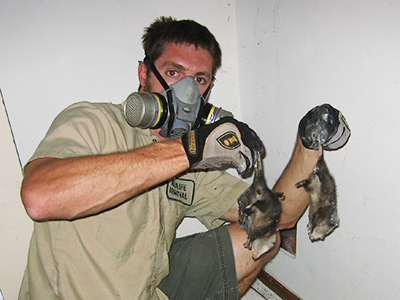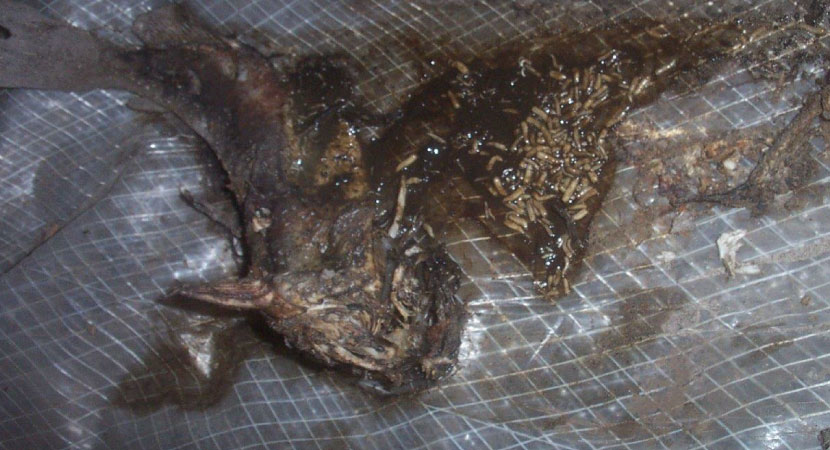Call me: 631-604-4164
Welcome to Suffolk County Dead Animal Removal! Got a terrible smell in your house, or do you see a dead critter on your property? We are an animal control company specializing in the removal of dead animals from your home, attic, basement, walls, yard, or any part of your property. You clearly don't want a dead animal in your house. Carcasses attract flies and give off terrible smells, not to mention the potential diseases rotting flesh can cause. Whenever we remove dead animals, we use 100% safe methods and make sure to disinfect your home and get rid of all traces of odor. Click here for Free Roadkill Removal and click here for Dead Pet Body Removal. For deceased wild animals in your home or property, call us anytime at 631-604-4164 to schedule an appointment for today! We come out fast! Some of the services we offer include:
- Dead Animal Removal
- Foul Odor Diagnosis
- Full Property Inspections
- House Damage Repairs
- Dead Body Location Services
- Proper Carcass Disposal
- Cleanup & Decontamination Services
- Deodorization Services
CALL US ANYTIME AT 631-604-4164

We are a dead animal removal company that will help you with your current predicament and prevent similar situations in the near future. Other companies will often overlook this critical step. The best thing that they will do is to mask the scent temporarily. Unfortunately, that is like sweeping the dust under the carpet. The decomposing body will continuously release body fluids that may contaminate your place; they can also emit fungal spores and bacteria that can cause diseases. The public has recognized us for delivering them the finest quality of solution for their expired animal problem. In fact, they have voted us as their top service providers for more than three years and counting. Our people will be ready to crawl on cramped areas to retrieve the carcass. We are armed with an industrial borescope to inspect the cramped spaces. We will use eco-friendly decontaminating solutions that are proven safe and effective in eliminating health threats. Our disposal method also conforms to the rules and regulations of the state. We will place the carcass in a tightly sealed container and transport them to our facility for incineration. For more information about the services we offer, or if you want a free no-obligation consultation, talk to our agents today.
What Prices Do We Charge?
Learn about dead animal removal costs - each situation is different!
What if you found roadkill or a dead animal such as a deer in a public place, and you want the city or Suffolk County services to remove it for free? Click here for Free Suffolk County Dead Animal Removal services. What if a farm animal like a horse, or your beloved pet dog or pet cat has died and you need the body taken away? Click here for Dead Pet Body Removal.
We are experts in dead animal removal, and take our job seriously. When removing dead animals, we do a COMPLETE job — not only do we remove the dead animal from your home or yard, we also decontaminate the area, deodorize it, and dispose of the animal or cremate it. If you aren't sure whether the stench in your house is due to a rotting carcass or another reason, we can sniff it out with our noses from our years of experience. We remove dead raccoons, dead opossums, dead skunks, dead squirrels, dead birds, even dead dogs and cats. We frequently remove dead rodents from inside walls, because poison kills rats and mice, who die in your house. We completely solve your dead animal problem by taking these steps:
- Sniff out the dead animal if it is somewhere in your home
- When necessary, for example if the animal is in a wall or under your house, cut a hole to remove the animal
- Remove the dead animal, safely and completely (and seal the hole if needed)
- Finish the job by decontaminating and deodorizing your home
- Properly dispose of the dead animal through incineration or other means
- Prevent it from happening again by finding out how they got in your house
Dead animal carcass removal is specialty work. Sometimes the job is simple, such as a dead opossum in the yard, in which case we can simply wear our gloves and respirator mask, bag the carcass, and take it away for incineration. Sometimes this is more complex, such as when the dead animal is under a home crawlspace, under a porch or deck or shed. Or if the animal is larger, such as a dog or a deer. The most complex cases are dead animals inside the house. The animal may have died inside the attic, or down in the walls, or the duct work, or any other part of the architecture. You may have a bad smell in your home, and you're not even sure what's causing it. We've removed not just dead animals, but rotting food, bad mold, etc. We specialize in locating the source of the smell, and we very commonly cut a hole in the ceiling or wall to remove the animal. We remove every bit of the carcass, mop up the juices, vacuum the maggots, spray it and wipe it down with disinfectant, cleaner, and we repair the hole we cut. In some cases we use ozone machines to neutralize odor.
Suffolk County Dead Animal Tip:
Who to Call to Pick Up Roadkill?
You're driving through your local neighborhood, and you spot a raccoon lying dead outside your home? It's a common sight. Whether it be a raccoon or a squirrel, a fox or even a deer, roadkill litters the streets following unfortunate accidents.

If it happens near your property, you don't merely want to leave the carcass in the open air. First, it will take weeks or months to decompose. During which time it will attract flies and pests, as well as dangerous scavenging animals.
Therefore, to keep your neighborhood safe and reduce disease risk, who do you call to pick up roadkill?
Who is responsible?
If an animal has been killed alongside a busy highway, it's a dangerous job cleaning it up. The same can also be true along local roads. Dead animals are significant sources of disease; handling them requires protective equipment and plenty of experience.
So, whose responsibility is it?
For many state roads and highways, there is a ‘maintenance protocol' that must be followed. In California, there are local animal control agencies tasked with the handling of dead or dying animals. Meanwhile, in other jurisdictions, the regional superintendent elects another entity to deal with roadkill. Suppose the animal killed is a domestic pet or livestock. In that case, the owner of the animal should be informed before disposal.
However, most of the time, a specific department handles the collection and disposal of roadkill, be it the beautification department, public works, animal control, or sanitation.
What to do if you find roadkill?
So, you're driving along, and you spot a dead cat or dog, you can take a look at its tag or knock-on nearby doors. These days, many pets are tagged. Therefore, taking the animal to a vet is the fastest way to identify an owner.
If you're dealing with a bigger animal, such as a deer or boar, you'll need to check your state's roadkill laws. Most often, if you call the local police department or Highway patrol, they'll either put you in touch with relevant authorities or do so themselves.
Considering sizable dead animals in the middle of the road are a significant risk to traffic, they'll likely send a team out quickly. Local authorities have clean-up crews tasked explicitly with picking up dead animals. If the animal is killed outside your home, you may want to speed up the process. Therefore, if you manage to contact such departments or teams directly, you'll have the carcass removed in no time by looking up your local legislation or regulations.
Can you collect the roadkill?
It's not everyone's idea of a meal, but for some, roadkill of a deer or boar is considered tonight's dinner. Before you fire up your barbeque, in some states, roadkill collection is illegal. However, in states like Massachusetts or West Virginia, you can remove individual animals according to legislation.
Amazingly, there are even roadkill cooking competitions!
However, if you're handling a dead animal, you should practice good hygiene. Avoid touching the animal directly with your hands. Instead, wear gloves and long-sleeved clothes. Once you've collected the animal, place it into a plastic bag or container. Animals commonly host a myriad of diseases; therefore, the collection of roadkill is not advised. Hence, its illegality in a large number of states.
Live in an extremely rural area? It may take some time before an animal control department can remove the kill. In such cases, pulling the animal off the road can prevent scavengers from becoming the next roadkill victim. It also stops cars from crashing into the animal at night.
To recap
If you spot roadkill near your home or out on a highway, contact the local authorities. Within the city limits, there is usually a department nominated for handling roadkill. They will send out a specialized roadkill team to collect and dispose of the body.
However, if you live in a rural area, it can be sensible to drag the roadkill off a major road to prevent further accidents. Wear protective clothing to avoid contact with potentially deadly or severe diseases. Collecting roadkill for consumption is not advised under any circumstances but remains legal in some jurisdictions.
We service nearby towns such as Holtsville, Riverhead, Huntington, Stony Brook, Smithtown, Brentwood, Islip, Holbrook, Patchogue, Southampton, Bay Shore, East Hampton, Commack, Port Jefferson,Southold, Ronkonkoma, Hauppauge, Brookhaven, Sayville, Central Islip, West Islip, Selden, Deer Park, Lindenhurst, Northport, West Babylon, Montauk, Coram, Centereach, Medford, Babylon, Hampton Bays, Shirley, Amityville, Rocky Point, Greenport.